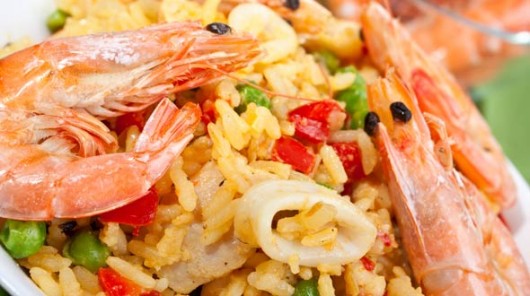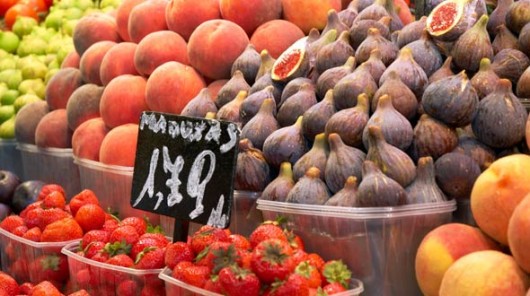Enjoy food in a healthy way. This is the first proposal in the Mediterranean diet, which was awarded the UNESCO Intangible Cultural Heritage designation. Based on the consumption of olive oil, vegetables and fresh seasonal products, the Mediterranean diet is an example to follow as far as eating is concerned – as well as being recommended by the doctor, it is extremely tasty. Come and discover it in Spain – it is one of its best-known features.
The Mediterranean diet is based on a balanced and complete diet following principles such as simple preparation and the use of fresh, local products, and if possible, seasonal. In Spain you enjoy it in several ways: taste it in restaurants, discover its products in the markets or at a meal with friends, for example.
A diet made in Spain
The Mediterranean diet is the basis of Spain’s food and many of its principles are present in the tastiest Spanish dishes.
For example, olive oil is the main complement in the Mediterranean diet. As well as adding a unique flavour and aromas, it is recommended for its health and heart benefits. Do you know that Spain is one of its main producers? The regions of Andalusia and Catalonia are the best known. In order to taste it, we suggest a salad with an olive oil dressing, or recipes such as gazpacho and salmorejo (cold soup made with tomato and bread).
The Mediterranean diet is essentially based on fruit, vegetables, pulses and dried fruit and nuts. They are bursting with vitamins and fibre, and Spain also stands out because of its produce. Some of the most outstanding fertile agricultural regions are in Navarre, Andalusia, Murcia, Balearic Islands and Region of Valencia. The latter is well-known for its citrus fruits. Other essential fruit includes bananas from the Canary Islands, strawberries from Huelva and Aranjuez (Madrid), Vinalopó grapes, and peaches from Calanda (Aragon), amongst others.
The Mediterranean diet also recommends consuming products derived from cereals, such as rice, as a good source of energy. In this sense, in Spain there are great rice-based recipes, mainly in the Region of Valencia, where the most popular dish is paella.
Other products in the Mediterranean diet are dairy products. The regions in the north of Spain are well known for their milk and dairy products, with traditional desserts, such as cuajada (type of curd cheese) and rice pudding. Cheese also complements dishes very often, and some of them are especially tasty, such as the Manchego (Castile-La Mancha), Burgos (Castile-León), Cabrales (Asturias), Idiazábal (Basque Country), and Majorero (Canary Islands), etc.
Amongst the recommendations in the Mediterranean diet we find a moderate consumption of eggs, and blue fish and seafood at least once or twice a week. First, why not try the tasty Spanish omelette? Regarding fish, Spain is washed by the Mediterranean Sea, the Atlantic Ocean and the Cantabrian Sea, so you can taste many types. Some of the most typical are anchovies (very common in Cantabria), cod (typical of the Basque Country), and “pescaíto frito” (fried fish) in Andalusia, and especially, seafood from Galicia.
Lastly, remember that drinking wine moderately, as part of the Mediterranean diet, is a very healthy habit. In Spain you can practise this with any of its tasty wines. One of the most internationally prestigious ones is Rioja, although there are many more to try.
Things to remember:
The Mediterranean diet is much more than a healthy gastronomic recommendation. It is a way of life that involves preparing food traditionally and enjoying it with friends and family, in a calm and relaxed environment. This is why it has been awarded the UNESCO Intangible Cultural Heritage designation.
You can discover many other Spanish products in the Mediterranean diet and learn about them in our section on Spain’s food.
If you would like to taste the most delicious wines and enjoy many activities related to our produce, we recommend visiting our section on the Wine Routes in Spain.
In order to learn more about the Mediterranean diet, you can visit the Mediterranean Diet Foundation’s website.






